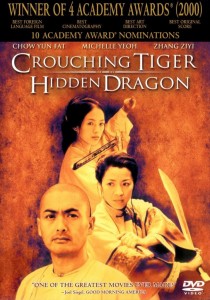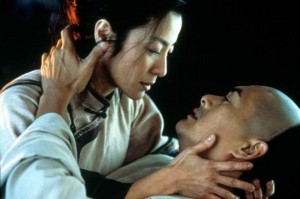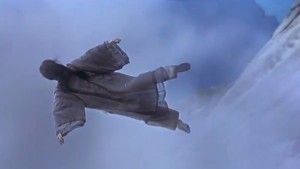One movie which offered up somewhat of a critical evaluation of Eastern mysticism and the Daoist Way is the martial-arts fantasy epic Crouching Tiger, Hidden Dragon (2000) starring Chow Yun-Fat and Michelle Yeoh. This film was directed by Tiawanese-born Ang Lee, filmed on location in China, based on a 1930s Chinese series of wuxia (martial hero genre) novels, and filled with an all-Asian cast. Movies with such credentials are usually unsuccessful in America, especially when they have subtitles or dubbing. But paradoxically, in America it became the highest-grossing foreign-language film in history. The film won the Academy Award for Best Foreign Language Film and was nominated for ten Academy Awards in all, including Best Picture.[i]
The film blends Chinese mythology and Daoist philosophy into a storyline about mystical Wudan warriors, a stolen sword called Green Destiny, and forbidden loves. In the novels and film, the martial arts techniques are based on real-life Chinese martial arts. Though the mastery of such techniques are highly exaggerated to superhuman levels of achievement and prowess— so much so that the warriors can transcend physical limitations, as when we see the warriors seem to gracefully soar over the rooftops in a chase scene. And much like the fictional Jedi Knights were mirrored after the Chinese Shaolin sect and its martial arts, the fictional Wudan warriors seem to have been mirrored after the Wudang sect and its martial arts which is based in Daoism. One of the main ideas in Daoism is the yin/yang duality of equal and opposing forces. As Chow Yun-Fat’s character says to his would-be disciple in Yoda-like fashion, “Real sharpness comes without effort. No growth without assistance. No action without reaction. No desire without restraint. Now give yourself up and find yourself again.”
Yet, unlike the Jedi Masters of Star Wars, the protagonist Wudan Master Li Mu Bai of Crouching Tiger tries to turn his back on his warrior life of detachment and following the Daoist Way. There is a tension between the film’s Western sensibilities of love and freedom and life-affirming beliefs and its homage to the Chinese martial hero genre of tradition, honor, and restraint and the Daoist beliefs behind it. This tension is most clearly seen in three important conversations had between the warriors Li Mu Bai played by Chow Yun-Fat and Yu Shu Lien played by Michelle Yeoh at the beginning, middle, and end of the movie. In the first scene between Mu Bai and Shu Lien, Shu Lien learns why Mu Bai has come. Mu Bai explains to her that he withdrew from training on Wudan Mountain. She is surprised and she says, “You’re a Wudan warrior… training is everything. Why did you leave your meditation?”
Mu Bai answers that “One day during meditation training I rose to a plane where there was utter silence. I was bathed in light and suddenly time and space did not exist; only absolute radiance, so wonderful I could not understand why the master had not shared it and then I felt…” Shu Lien interjects, “enlightened?” To which he responds, “No, because I did not sense the overwhelming bliss that one should feel. I felt that it was something like despair but greater. And in that sorrow so intense I could not take it I could not go on. I failed. Something was saying return to reality.”
This is an interesting exchange that underscores the film’s tension between love and restraint, freedom and obligation, and attachment and detachment that will be fleshed out throughout the movie. In Wudan teachings, as in Eastern philosophy, the world is illusory and detachment is the way to enlightenment. Yet it seems that Mu Bai’s ‘something’ that pulled him back to reality was his attachment to Shu Lien. And the feelings are mutual. After this exchange, Mu Bai tells Shu Lien that he has come to give the 400 year old mystical Green Destiny sword to a friend for safe-keeping as he wants to relinquish the warrior life and leave it behind.
In their second telling conversation Mu Bai’s restraint as a ‘crouching tiger’ full of discipline, restraint and heroic responsibility lessens. To show how he is wrestling with his thoughts he boldly takes Shu Lien’s hand and brings it to his cheek in a touching embrace and says, “Shu Lien, the things we touch have no permanence. My master would say… there is nothing we can hold onto in this world. Only by letting go can we truly possess what is real.” This is Daoist thinking through and through.
Shu Lien replies, showing that she has also been thinking less than orthodox thoughts, “Not everything is an illusion. My hand… wasn’t that real?” Mu Bai says “Your hand, rough and callused from machete practice… All this time, I’ve never had the courage to touch it.” He continues. “Giang Hu (the symbolic world of Wudan warriors) is a world of tigers and dragons, full of corruption… I tried sincerely to give it up, but I have brought us only trouble.” Shu Lien replies that “to repress one’s feelings only makes them stronger.” Mu Bai replies “You’re right, but I don’t know what to do. I want to be with you… just like this. It gives me a sense of peace.”
In the third and last conversation, Mu Bai has been wounded, and may be dying. He wants to use his last breath to speak his love to her, but Shu Lien says, “Use it to meditate. Free yourself from this world as you have been taught. Let your soul rise to eternity with your last breath. Do not waste it… for me.” Mu Bai replies, “I’ve already wasted my whole life. I want to tell you with my last breath… I have always loved you. I would rather be a ghost, drifting by your side… as a condemned soul… than enter heaven without you. Because of your love… I will never be a lonely spirit.” As one critic puts it, this is a remarkable repudiation of Mu Bai’s Wudan philosophy and by extension Eastern thinking. The ultimate goal in life isn’t detachment or embracing a world-denying philosophy to achieve enlightenment. While the message of love doesn’t go so far as to be full of Christ, it still offers more than the negative Way of Daoist mysticism.
And for those who want a mystical Eastern-like ending, there’s that as well. The young and self-trained Wudan warrior who is more a passionate and hidden dragon than a disciplined and crouching tiger, Jen, finally arrives at Wudan Mountain for training and to be reunited with her desert love, Lo. While the forbidden love of Mu Bai and Shu Lien is given in to, the forbidden love of Jen and Lo is denied to them and the audience. In what must bewilder many of us, Jen jumps from a bridge and descends into the clouds chasing after the Green Destiny sword to close the film. Viewers can interpret the ending many ways I think, but all of them have a mystical component— whether she transcended the material world ‘by truly letting go’ in a way Mu Bai couldn’t or wouldn’t, or she altered reality by realizing the impermanence and illusory aspect of the world, or she just disappeared never to be seen again.
For me, these pantheistic underpinnings don’t make me shy away from watching these types of movies. Nor do I watch them as a naive consumer stuffing it into my brain along with the popcorn. I watch these movies with discerning glasses on and a baloney detector in my hand. I think that movies are a great way to flesh out philosophies, ideas, and ultimately worldview orientations and make them real and understandable. It doesn’t mean I’m going to believe them, but I will think about them and enjoy the ride.
[i] http://en.wikipedia.org/wiki/Crouching_Tiger,_Hidden_Dragon


